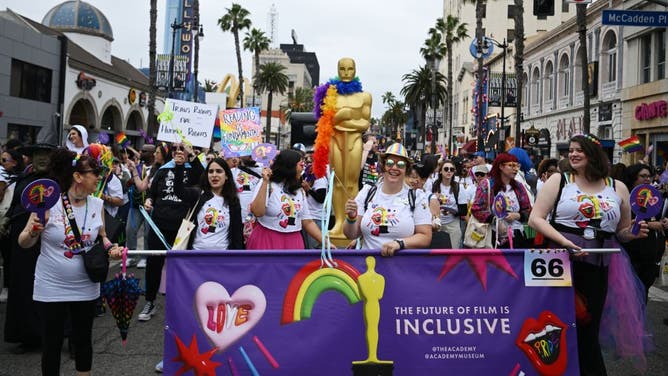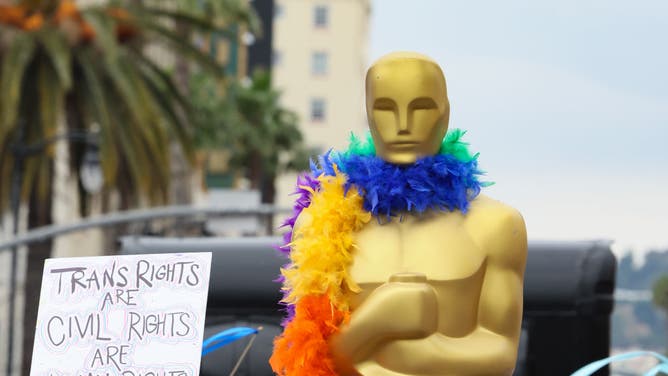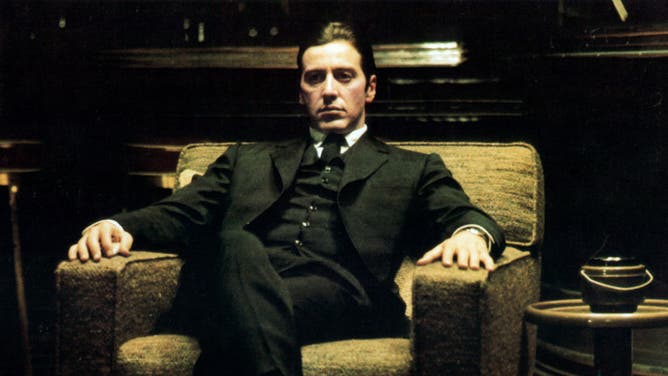Hollywood Sounds Off On New Inclusivity Rules For The Oscars
Hollywood never stops trying to out-woke itself.
The Academy of Motion Picture Arts and Sciences has introduced a set of inclusivity standards. In order to receive a nomination for "Best Picture" at the Oscars, a film will have to check the boxes.
To gain consideration for the prestigious award, the movie must feature a lead or significant supporting character from an "underrepresented racial or ethnic group," have a main storyline that focuses on an underrepresented group, or at least 30 percent of the cast comes from two or more underrepresented groups.
Those "underrepresented groups" include women, ethnic minorities, LGBTQ and the disabled.

"The future of film is inclusive." Activists celebrate at the L.A. Pride Parade. (Photo by ROBYN BECK/AFP via Getty Images)
The other standards include diversity on the leadership and project team, industry access and opportunities for underrepresented groups, and inclusive representation in marketing.
Notice none of the "Best Picture" requirements have anything to do with the quality of the film itself.
Identity politics only.
Some Hollywood stars aren't happy about the Oscars changes.
And that includes award-winning actor Richard Dreyfuss.
While discussing the new standards of inclusion with PBS's Firing Line, the 75-year-old actor said the rules "make me vomit."
"No one should be telling me as an artist that I have to give in to the latest, most current idea of what morality is," Dreyfuss said.
And many folks behind the camera agree.
"It's completely ridiculous,” one director told The New York Post. "I'm for diversity, but to make you cast certain types of people if you want to get nominated? That makes the whole process contrived. The person who is right for the part should get the part. Why should you be limited in your choices?"
Hire an actor, videographer or director based on merit? That's a wild concept.

(Photo by Rodin Eckenroth/Getty Images)
"Everyone thinks the Academy went too far. It's ridiculous to tell us we have to regulate our work," a successful producer told The Post. "We talk about it amongst ourselves but it’s not worth speaking up publicly."
An industry insider defended the new Oscars rules, saying, "Their goal is not to disqualify any films, but rather to celebrate and encourage progress towards greater representation and inclusion in the industry."
Many great films do not adhere to these standards.
"All Quiet on the Western Front would not have been nominated," said the director of the World War I film with a historically accurate white male cast.
Other past nominees including Ford v Ferrari, Once Upon a Time in Hollywood, American Hustle and Joker would also be ineligible now.
What about Schindler's List, which won best picture at the 66th Academy Awards? Depends if you count Jewish people as "white" or "underrepresented."
And the 1973 Best Picture The Godfather? Fuhgeddaboudit!

The Godfather is one of the greatest films of all time. But it's about white guys. (Photo by Paramount/Getty Images)
"Imagine if great films were not made because of studio or corporate mandates that every film has to conform to the standard for a Best Picture nomination?" one director said.
But moving forward, filmmakers may just have to make the movies anyway. Just accept the fact they probably won't win an Oscar.
And one Hollywood executive told The Post he's ready to go that route.
"You have to make the best movie," he said. "I want to be inclusive, but I don't want to put in a person from a certain ethnic group who doesn't belong there because of the story being told. And I don't want to make a movie with an LGBT character who does not make sense with the narrative. You can't do this without hurting the movie."
So who knows? Maybe Hollywood has finally out-woked itself.
But if you suddenly start seeing a bunch of movies about trans indigenous abortion clinic doctors with racially diverse, gay best friends and a three-legged dog, you know why.